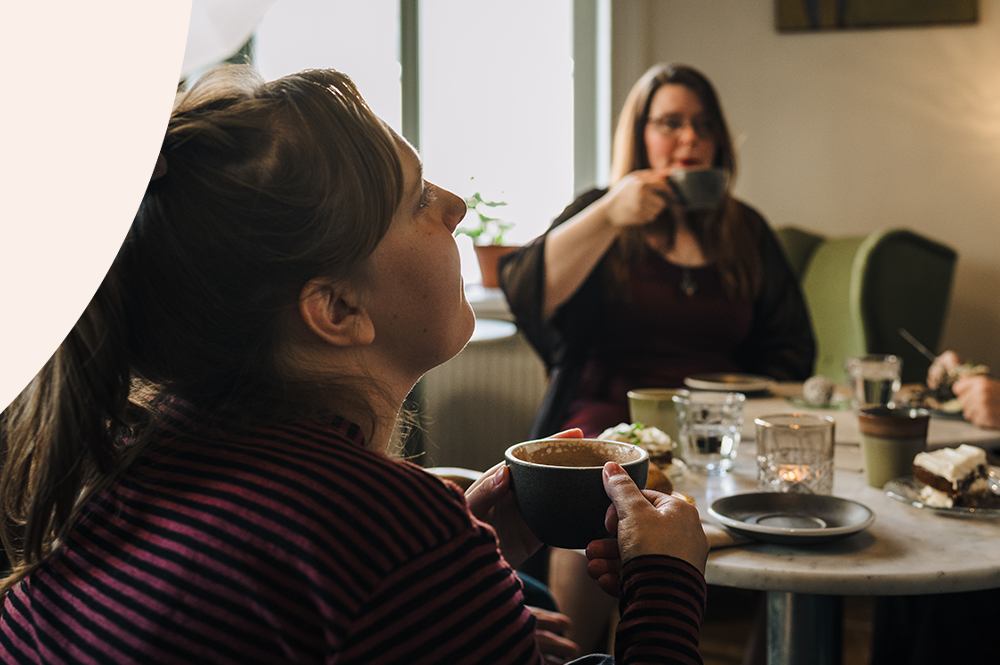Social anxiety
Social anxiety means that you feel severe discomfort in social situations. You worry about being scrutinised, making a fool of yourself, being socially rejected, or losing control when others are watching. For some, anxiety is present in many different social situations, such as going to a party, shopping or chatting with people. For others, it is more specific. It may, for example only occur when performing in front of others.

It’s good to remember that everyone can feel shy or nervous at times. In social anxiety, however, this nervousness is so strong and recurring that it prevents you from doing things that you want or need to do in your everyday life. You may have concerns in advance about a situation that causes feelings of discomfort, and dwell on it for a long time afterwards. The physical symptoms of social anxiety can include feeling dizzy, having heart palpitations or a dry mouth.
It can be difficult for students in various ways. Giving oral presentations or asking questions in front of others, group work or travelling on public transport to your place of study are examples of situations that can be challenging.
Safety behaviours are common when you have social anxiety
Fear can cause you to start avoiding social situations. You may engage in so-called safety behaviours to reduce anxiety or the risk of embarrassing yourself. Examples of this include practising in advance what to say when you meet someone, looking away to avoid eye contact, or trying to keep track of how interesting or boring you seem.
Unfortunately, such behaviour is not a good way of dealing with anxiety. One reason that social anxiety continues is that your attention becomes too focused on yourself, and you get caught up in the image of you that you think others see. “Everyone sees me blushing”, “I look insecure and stupid”, “I’m so quiet and boring”. That focus prevents you from taking in outside information about what is actually going on around you, and so you perceive your negative interpretation of the situation to be true.
What you can do yourself to deal with anxiety
There are a lot of things you can do on your own to deal with social anxiety, and here follows some advice that can be help you along the way. If you find it difficult to make any progress on your own, help is available. Under the heading “When should you seek help?”, you will find suggestions on where to turn.
- Try to change the way you view social interaction
Try to have the attitude that social interaction is not about you looking “good” or “bad”, but about being part of and taking part in other people’s lives, ideas and experiences. - Beware of behaviours that aim to get rid of anxiety
The most constructive thing is to try to change your attitude to anxiety. Try to allow it to come and to focus on gradually doing more of what you want to do, despite the feelings of anxiety. - Similarly, try to refrain from safety behaviour
Choose something that you usually do to reduce the risk of social failure, and try actively abstaining from it. Then evaluate how it went. One example is to try to spend more time turning your attention outward when talking to someone. Show interest and listen actively, and focus less on how you are perceived. Start training in easier situations and increase the difficulty level gradually. Practice often and stay in the situation instead of avoiding it. - Try not to dwell and scrutinise - even if you are triggered to do so
Try not to examine how the social situation went afterwards, even if you feel like doing so. It may be easier to abstain if you do something that you can focus on instead of dwelling on the situation.
To prevent anxiety in general, you should remember to stick to your routines for eating, sleep and exercise. Physical activity can help relieve your anxiety.
When should you seek help for social anxiety?
- If you experience strong social anxiety that limits you and makes you avoid social situations.
- If you have difficulty sleeping or concentrating, or are depressed because of your social anxiety.
- If you relieve your anxiety with alcohol, drugs, or by hurting yourself.
You can turn to the student health service for support and advice, or for guidance on where you can seek help. You can also contact your local healthcare centre or seek help via 1177.se.